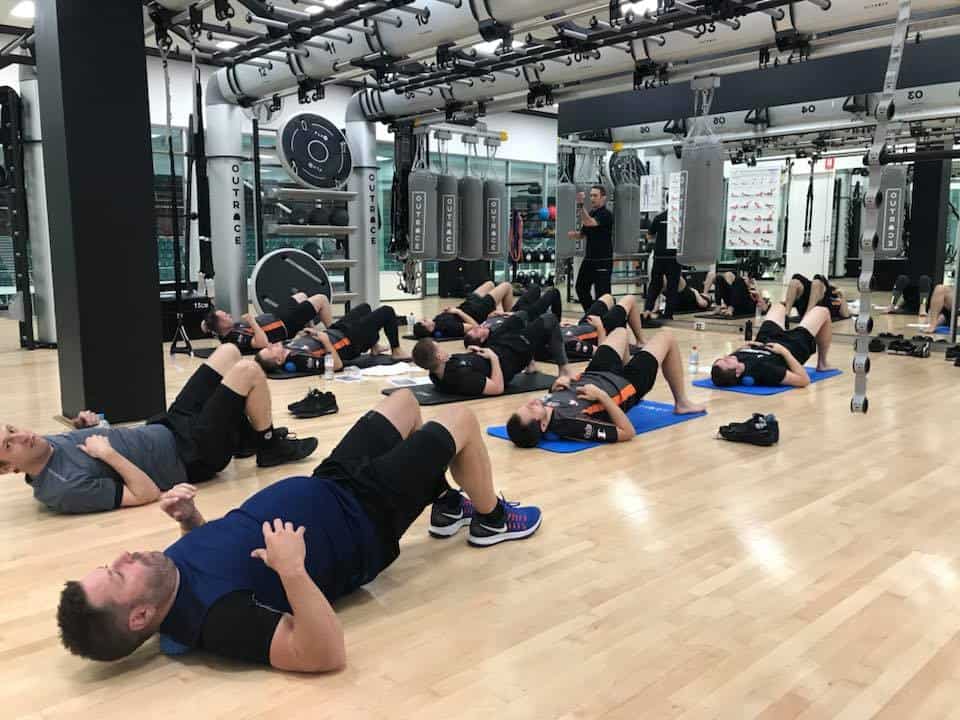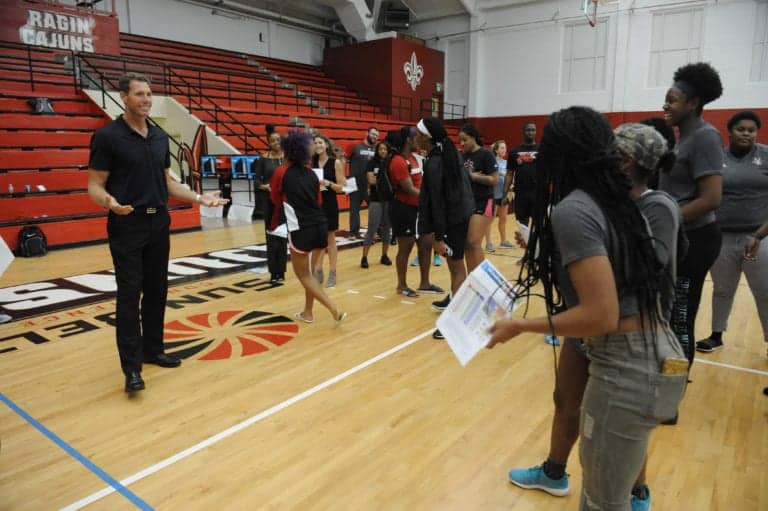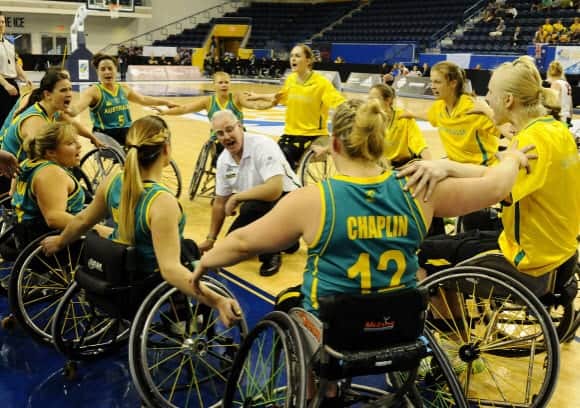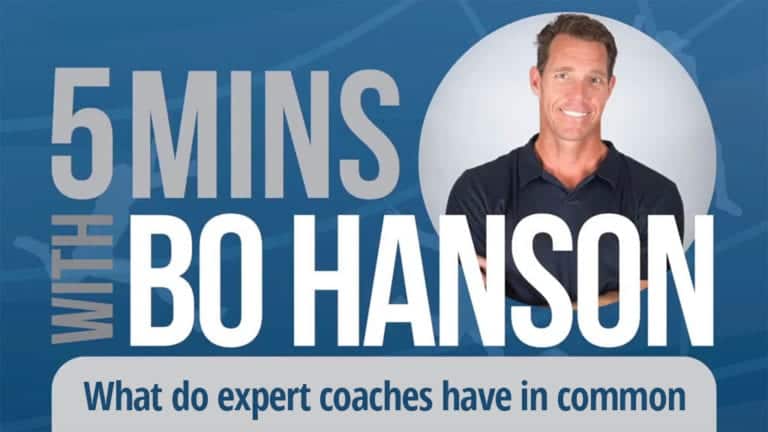Stewart Briggs, Performance Coach on innovation, culture, work ethic, coach development and CoachDISC
Extraordinary vertical jump heights, split-second qualifying times, personal bests; these are the statistics flying around the floor at Acceleration – the high-performance development centres, owned and founded by Stewart Briggs, located in Queensland, Australia.
The energy and optimism in the room at Acceleration centres is infectious. Everybody’s working on their own program, some target speed, some work on their core strength, while other athletes are improving their general agility. Stewart, a Strength and Conditioning Coach told us that at Acceleration, it’s not uncommon to see a 4-12cm improvement in jump capability within two months. Intrigued by the mechanisms that drive this level of improvement, we could see the physical processes all around us but knowing his innovative approaches, we asked him how important mental state is in a developing athlete’s improvement.
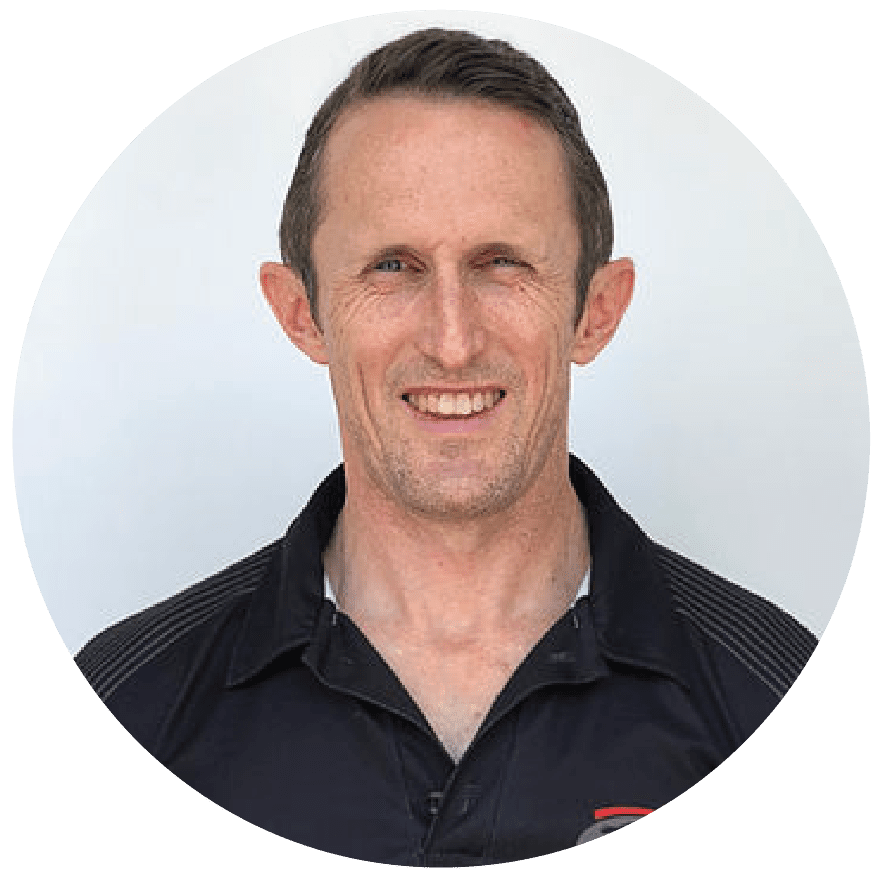
He replied, “Huge. There is a placebo effect, such as I tell athletes that they are going to get better before they start training with us. This makes them believe that that will get better and therefore train harder to make their belief a reality. At the end of the day it does not matter how you get there (within the rules), but as long as you get there.”
Given that most of Stewart’s clients are young, talented and identified athletes, we asked him about the most critical considerations for working with young developing athletes. He said there are so many, but for him the top 3 are,
- Good Attendance,
- Good Attention to Detail/Effort when they are there,
- Connecting their strength and conditioning sessions to their sports training sessions or competition.
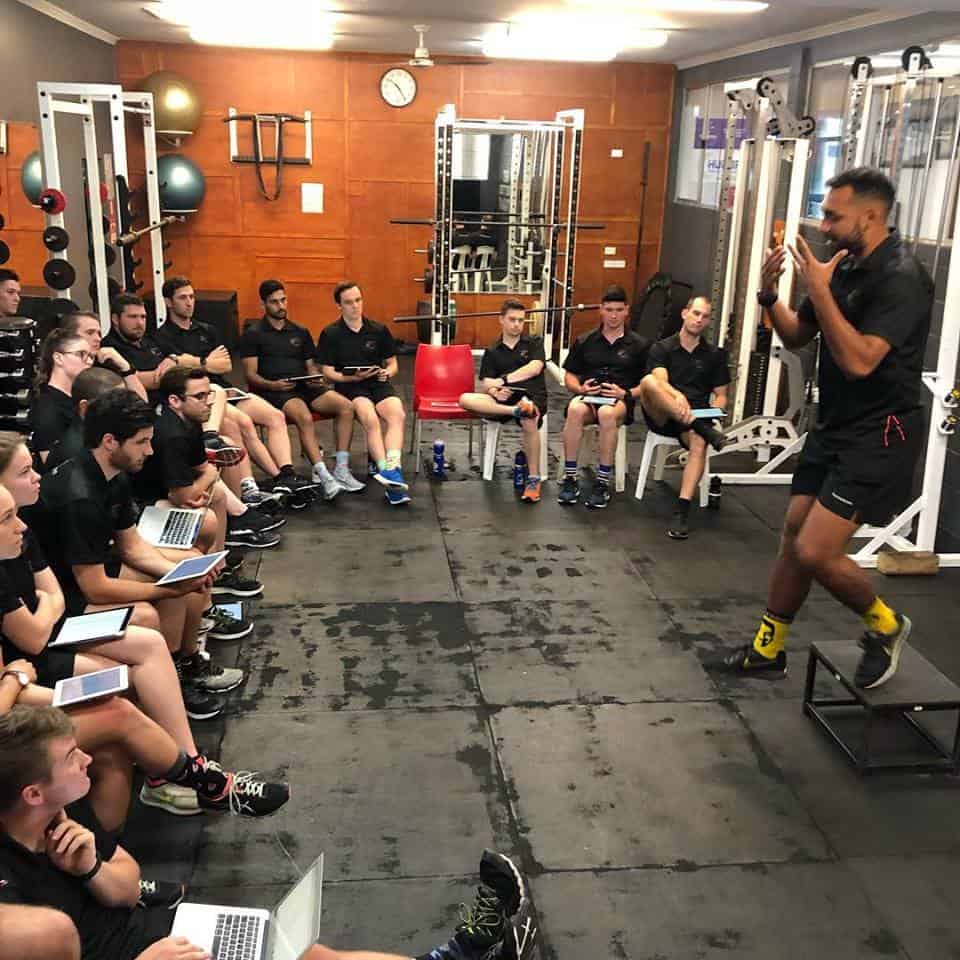 One of the most exciting and inspiring aspects of working with a Strength and Conditioning Coach or Exercise Physiologist is their innovative approach and support for your goals, Stewart Briggs is no exception. He’s excited by things he’s never seen before, 100 cm vertical jumps, he speaks animatedly about growing developing athletes. He says how much “a few changes in athleticism can do for a young athletes’ confidence”, and then he reflects on what that can do for their performance in competition. He gives the example of Libby Trickett, Australian triple Olympic gold medallist and client who broke the world record which was her goal, but he explained that the remarkable thing was that she probably broke it 1-2 years earlier than even he thought.
One of the most exciting and inspiring aspects of working with a Strength and Conditioning Coach or Exercise Physiologist is their innovative approach and support for your goals, Stewart Briggs is no exception. He’s excited by things he’s never seen before, 100 cm vertical jumps, he speaks animatedly about growing developing athletes. He says how much “a few changes in athleticism can do for a young athletes’ confidence”, and then he reflects on what that can do for their performance in competition. He gives the example of Libby Trickett, Australian triple Olympic gold medallist and client who broke the world record which was her goal, but he explained that the remarkable thing was that she probably broke it 1-2 years earlier than even he thought.
Stewart is continually building on strengths and finding new ways to improve performance. He took a moment to bring us up to speed on the way he’s working with his team of 20 coaches across three Brisbane locations to find new and innovative ways of elevating athletic performance. He talked to us about creating a culture and history of hard work, the mindset and the visuals. He explained the way he invests in his coaches’ development so their connection and impact on the athletes they work with is even more profound, giving them the ability to build performances to levels never been before.
But despite all of this, when the day ends, everyone’s judged by their results. Of his success Stewart says, “I have worked with people who played in the NHL, NFL, NBA, MLS, AFL, NBL, WNBL, WNBA, 2004, 2008, 2012 Olympics, World Championships for many different sports and the FIFA World Cup. If you have been doing something as long as me, you are bound to be fortunate enough to work with athletes who have reached the top of the world. Honestly they are just things to talk about at a dinner party.”
“The REAL things are the training sessions and the carving away of training processes that work better every single year to a stage that we are getting good to great results every single year with any athlete.”
Stewart has taken those training processes and turned them into a culture that transcends generational change or staff and athlete turnover. That culture of hard work and achievement is the foundation of Acceleration’s success.
Stewart explains why hard work puts athletes ahead of their competitors. He says, “you need to “stay in the game” – meaning that you just need to outlast the people who are not willing to continue to work.”
He explained why he developed that personal mantra and how it has served him, he says,
“Stay in the game” is something I came up with in the USA as a young Australian who was small in stature and trying to carve out a career that was built for ex-NFL players basically. I just out studied, out worked and out smarted my opposition coaches to gain credibility in an extremely competitive environment.”
He adds, “obviously you need to continue to innovate and look for better ways to do things, but at the end of the day I have seen so many more talented athletes quit when things get hard. It is the combination of genetics with hard work which produces the most amazing results, but even genetics can sometimes be trumped by a sickening level of hard work and commitment.”
To keep that culture of work ethic and achievement current, Stewart set up the Acceleration Honour Board. He explains that it holds Acceleration’s history, he says, “I think people need to understand that they are not alone in their journey and that other people have been there and done it. Kind of like when I went Canyoning in Tasmania. Once I saw the instructor jump into the water from 10m high rock then it was easier for me to believe that I could do it. I also was interested in building this long term culture of training hard day after day, week after week, month after month, year after year. The athletes are nominated by our coaching staff and then a case is put forward for each nominee and then all coaches vote for the athlete of the year.”
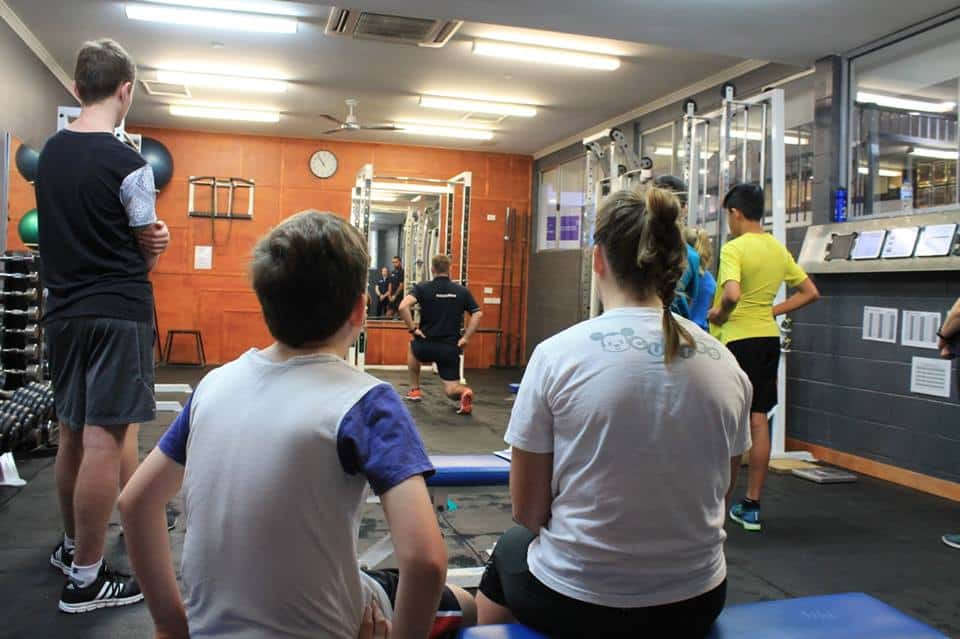
To keep creating those statistics, Stewart’s dedicated to developing his team of coaches. He tells us about the potential of that impact, “I think it is more about my staff these days – seeing them move on in their careers to where they are happy. It is important to develop the next generation of coaches so that they can go away and help 1,000’s of athletes themselves which means that if 10 out of 20 coaches progress on for the next 20 years and work with 1,000 athletes each then Acceleration helped 10,000 indirectly let alone the new coaches that come through each year. Who knows – Acceleration may have helped over 100,000 athletes either directly or indirectly which is certainly something to get up in the morning for.”
So, every two months Stewart gathers his team together for Professional Development Days. During these days, the team work on the technical and non-technical skills that allow them to develop their client’s abilities. At these days, Athlete Assessments runs a series of coach development workshops using the CoachDISC Profile as the foundation of this work. In preparation for the workshops, each coach takes a short survey so they can receive their individual profile. The CoachDISC Profile enable coaches to better understand their own coaching styles, and the behavioral styles of their clients – ultimately allowing them to design and deliver better training sessions tailored to each client’s specific style.
Performance Coaches are completely committed to improvement and accordingly Stewart’s team make the most of the opportunity to develop their skills. He reports that there was an immediate increase in empathy across his team. He said that they were often trying to imagine how the other person was thinking, feeling, interpreting their comments.
Further, he says his team “feel like they are getting a better understanding of themselves and others. Also (there are) a few Ah-Ha moments from past positive/negative experiences.”
Stewart explained the way the workshop training was implemented immediately, he said straight away it was useful in the more the extreme cases and his team use DISC to communicate better with, “old grumpy coaches, poor listening athletes, difficult parents. By us understanding CoachDISC we have been able to make better judgements on the staff who should take certain programs etc. Later on, I can see it helping across all cases, but right now it is the obvious ones that stick to mind.”
Explaining how he personally uses the CoachDISC, he says:
- It helps me to place staff into roles that suit their behavioral profile,
- It helps me to understand each staff member better so that I can mentor them better for their career now and into the future,
- It helps me understand sports coaches better so I can interact with them better so our relationships improve.
He adds, “I like things that WORK. Athlete Assessments WORKS – it is applied, it is real and you can see the results immediately. Basically, bringing in Athlete Assessments as a corner stone to our staff development has been well received from our staff from day one. The most important part is that I am going to be able to come back to Athlete Assessments every time we get a new staff member so we can see how their behavior profile fits into our company as a whole.”
Stewart understands how important coaches are in athlete’s lives. He knows how powerful the relationship is and the way coaches have the opportunity to influence athletes. Coaches are role models, leaders and teachers. In addition to improving athleticism, coaches have an opportunity to develop life skills like character, work ethic and persistence.
He says, “I am about people being healthy and happy AND achieving their dreams. Remember there is always more to training than JUST training. Young athletes need to be mentored by many people including their Strength and Conditioning Coach.
Underpinning all of Acceleration’s endeavors is a level of professionalism. You can see it in the way coaches interact with their athletes and you can hear it in the feedback that clients give when they talk about Acceleration centres.
Stewart says, “Acceleration will go through a period of significant growth in the next 3 years with the intention of licensing out Acceleration programs across Australia. Athlete Assessments will be an important part of that growth as we interact with people with renewed confidence.”
Stewart and Vicki Briggs founded Acceleration in 2000, they are now in three locations, Auchenflower, Southport and Chandler across Queensland, Australia. The concept came from the United States, where Stewart studied and worked as a College Strength and Conditioning Coach. Having grown up and played sport in Australia, Stewart knew first hand that American athletes received far more guidance, help and coaching when it came to increasing their strength, power and speed. Through his work experience and education, Stewart was certain that he could make a difference to developing athletes. Hence the reason for the name: “Acceleration” – the one facet of sport that is most needed for success in the majority of sports throughout the world.
Where to from here?
How well the ‘people side’ of sport is handled directly impacts whether the team wins or loses, whether people are loyal to the program or leave, and overall how much people enjoy their sport. Develop the vital ‘people skills’ in your Coaches that will differentiate them in the competitive employment market that is elite sport. Athlete Assessments can help you specifically in this area. Please contact us to find out how we can assist you in transforming your coach development with focus on the skill development that truly has impact.
At Athlete Assessments we’re here to provide you with excellence in service and to help you be your best. If there is anything we can do to be of service, don’t hesitate to contact us.
Recommended Articles
On a daily basis, the Performance and Wellness Institute is buzzing with athletes practicing their verticals, leaping between stations, pushing their strength towards numbers that were previously unimaginable, while rehabbers are moving with increasing degrees and fluidity. But this isn’t what distinguishes the Institute, enter Crisa Renard and Ryan Wasilawski, these two Exercise Physiologists and their investment in every individual is what’s behind the success stories that clients are quick to share.
When you visit University of Louisiana’s campus and see the new athletic facilities, a testament to the University’s investment in recent years, you’d understandably be impressed with their focus on the physical side of development. But, you would be misled. What you quickly learn, when you dig a little deeper, is that they are committed to a holistic approach to development across the entire Athletic Department.
The first cohort of ten women Coaches, graduates of the NCAA Women Coaches Academies, are set to submerge themselves in Academy 2.0, a specialist extension program for graduates run for the first-time at the upcoming 43rd Women Coaches Academy in Denver, Colorado this December.
A Coach’s role is always evolving. Something Tom Kyle, Coach Development Manager for Basketball Queensland understands and loves about his job.
His role with Basketball Queensland means he’s responsible for developing some 2,000 Coaches at a club, association and school level throughout Queensland, Australia.
Watch Bo Hanson discuss what expert coaches have in common and what is the key factor in what makes these top coaches so great. Recorded during an ABC TV Interview, find out why adapting your behavior to suit the needs of your athletes is vital to improving sports performance. Don’t miss these important insights.
By Bo Hanson - 4x Olympian, Coaching Consultant & Director of Athlete AssessmentsThe 2008 Beijing Olympic Study, undertaken by the Canadian Olympic Team, shed light on the factors leading to either personal best performances or Olympic…
Ever spent time wondering how expert coaches operate? In this article we take a quick look at what the 'experts' do that makes them experts. This research was derived from how experts conduct themselves across a wide domain of industries and areas of endeavor. Expertise is universal and we apply this to coaching sport.


